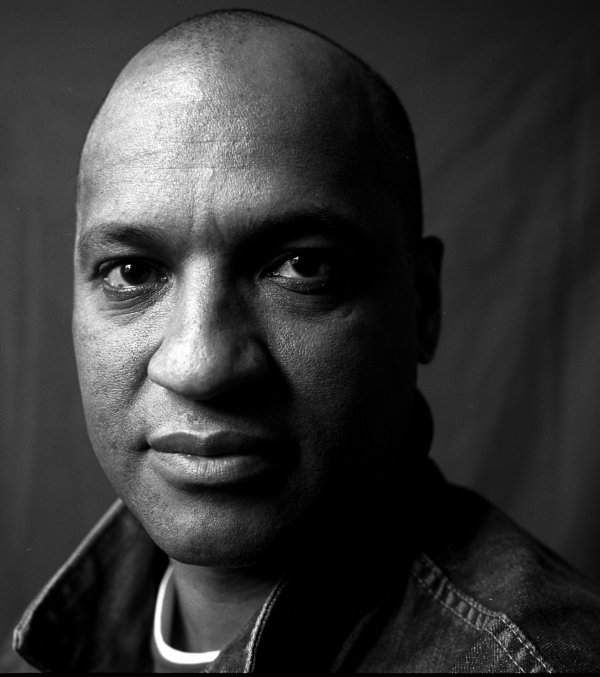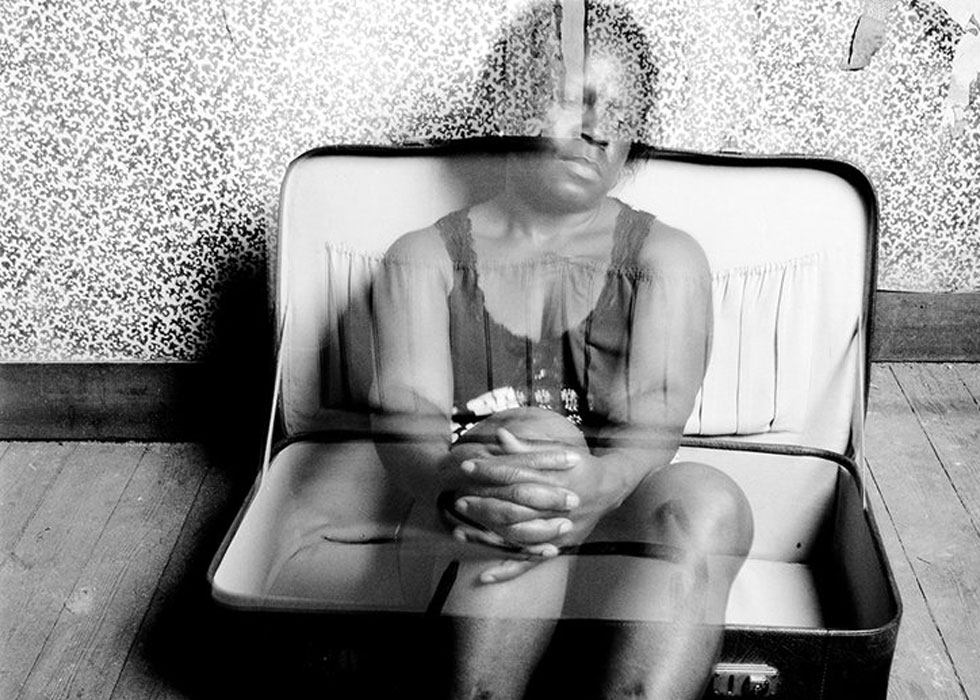Professor Mark Sealy delves into the work of the Togolese-Belgian photographer Hélène Amouzou. Amouzou creates distinctive imagery through long exposures, generating photographic apparitions that speak to the issues of displacement and exile. We're publishing the work as Autograph opens Voyages, the first UK solo exhibition of Hélène Amouzou's evocative self-portraits.
I remember that I am invisible and walk softly so as not to awaken the sleeping ones. Sometimes it is best not to awaken them; there are few things in the world as dangerous as sleepwalkers.
— Ralph Ellison, in the prologue to Invisible Man ¹

If we allow our eyes to rest on the photographs produced by Hélène Amouzou, it quickly becomes apparent that there is a disruptive, troubling, and unsettled paradigm present, as the works carry an unnerving autobiographical political charge that calls into question how and when we (society) take responsibility for the stranger in need. The black body in the context of this series of images is transitioning, painfully transforming, caught between STATES, exposed on every front, and trapped indeterminately, aligned only to no place. Amouzou’s works function as symbolic notes to how one survives psychologically in the space of in-between.
In the land of no place, people are rendered less than human, aliens that must be tamed, suppressed, expelled, and when necessary, killed. But aliens are patient, they wait sometimes for decades for the State of recognition, a place to call home, and acceptance. Amouzou’s works are culturally and politically challenging because they evoke all the world’s human subjects who are caught in the horrifying colonising maze that keeps them trapped, caged in a state of emergency—a condition or sentence that means a life lived outside of the law, hyper-alert and emotionally taxed, near invisible, where a subject’s innocence is devoured by experience.
Here, Amouzou’s photographs become talismanic symbols that point to difficult conversations concerning exile, displacement, migration, refuge and the state of human rights across the global north. The radical visual alchemy her work produces is that she makes present the undocumented or “non-person” not as victim, but as a subject suspended in colonial time—an autobiographical political presence that refuses to be erased.
Amouzou has transformed her invisible self into a haunting reality that moves the viewer beyond the image and into to a catalytic sensorial space producing difficult dialogues concerning political disavowal. Her work, therefore, calls forth our colonial present. In rendering her presence spectral in nature, she offers a reflective moment across our time to consider all those peoples of the world, past, present, and future, who have not and will not be allowed the right to imagine a future.
These photographs critically function across myriad cultural and political dynamics; they reveal and attempt to heal the traumas of asylum and dispossession. The use of the self, fused with the evocative symbol of the suitcase, not only conjures a sense of displacement and uncertainty but also calls into question the difficulty of managing difference and one’s own cultural baggage. The empty suitcase deployed here calls back into focus not that which has been brought or left, but all those things that simply can’t be seen or neatly packed away—the internalised baggage of life.
Amouzou reminds us that she and many of her fellow travellers (the dreamers) are seemingly only allowed to exist as ghosted or invisible people. But her ghostly presence here is not one that screams. Amouzou’s ghosts come with an inquisitive, tentative, reflective, and concerned gaze. The power then of her work is that it opens a new space where in the end empathy is awake and difference is allowed to lounge in permanence and cultural splendour. Should we care to pause on the journey of our own myopic lives and take time to consider the generosity of Amouzou’s images, we can see and feel that we are not being haunted, but invited into a spiritual world where conversations awaken curiosity and crush fear.

In a space before time and words, the world was covered in a thick blanket of darkness. It was a warm and loving covering. Since it was hard for the spirits who inhabited this space to see one another they learned to live by and through touch. So if you were running around lost you knew you were found when arms reached out in that loving darkness to hold. And those arms that held the spirits in that beautiful dark space before time are holding us still.
— bell hooks, “Dreaming Ourselves Dark and Deep Black Beauty,” in Sisters of the Yam: Black Women and Self-Recovery ²

Dr Mark Sealy OBE is Executive Director of Autograph (1991–) and Professor, Photography, Rights and Representation at University Arts London – London College of Communication. Mark is interested in the relationship between art, photography and social change, identity politics, race and human rights. He has written for many of the world’s leading photographic journals, produced numerous artist publications, curated exhibitions, and commissioned photographers and filmmakers worldwide.
Lawrence & Wishart have published his more recent critical writings on photography. These titles include Photography: Race, Rights and Representation, published 2022 and Decolonising the Camera: Photography in Racial Time, published 2019.

22 Sep 2023 - 20 Jan 2024
Contemplating the complex emotions of displacement and exile
Images on page: Hélène Amouzou, from the series Autoportrait, Molenbeek, 2007 - 2011. ©Hélène Amouzou. Courtesy of the artist.
About the author: Mark Sealy, courtesy of Steve Pyke.
Footnotes: ¹ Ralph Ellison, in the prologue to Invisible Man, (Penguin, 1965), p8.
² bell hooks, “Dreaming Ourselves Dark and Deep Black Beauty,” in Sisters of the Yam: Black Women and Self-Recovery, (first edition, South End Press, 1994), p79.
Autograph is a space to see things differently. Since 1988, we have championed photography that explores issues of race, identity, representation, human rights and social justice, sharing how photographs reflect lived experiences and shape our understanding of ourselves and others.